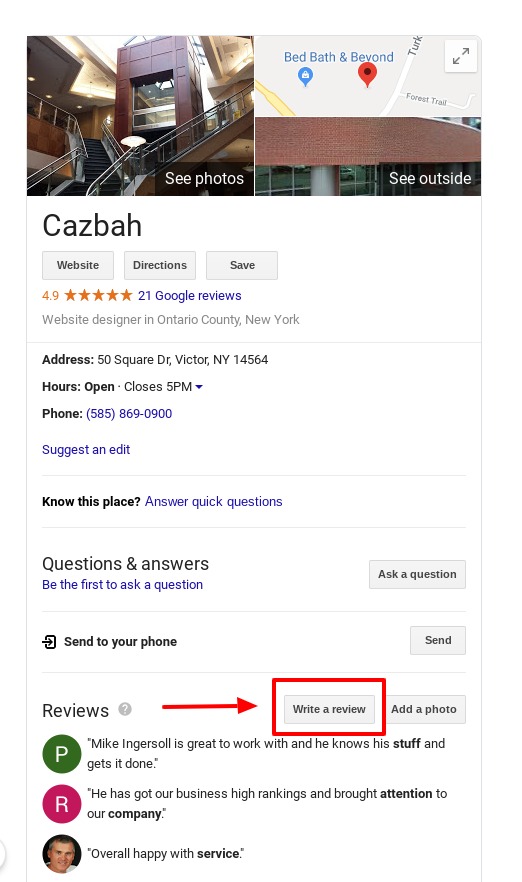For any small business, learning how to build a good online reputation is paramount.
While this statement is certainly nothing new, the mediums by which your potential customers perceive this reputation have changed. The transition from the bulky yellow books of yesterday to the mobile devices of today has altered the path to establish small business credibility and reputation.
How Reputation is Determined Online
Without a well-known, positive reputation, small businesses will find it hard to compete within their industry. More and more online searchers are turning to the web to research a business’ band, products, and services well before they come into contact with them. Over the years, tools like Yelp, Google reviews, and buyer feedback sections have become critically important in the buying process. Online searchers have begun to place their trust in online reviews and what others have said previously about a business’ service, quality, and brand.
Now more than ever, small businesses need to start prioritizing building their online reputation in their niche.
The process of how and when brand reputation is determined for most small businesses takes place in these three steps:
1. Initial Discovery: What is a customer’s initial reaction to your website? How is your company’s result displayed in an organic search? An appropriate use of rich snippets (how your listings appear in search engines) is an incredibly effective way to establish credibility upon the initial discovery. Having up to date and consistent listings among local business directories is important, because they’re often a source of initial business discovery.
2. Further Assessment: After a searcher discovers your business, are they satisfied by your star rating? Most likely, some degree of evaluation takes place initially, but then they dig a little deeper. The important factor to understand in this stage is what kind of assurances your audience will be looking for, and where they may be most likely to find it.
3. Continued Efforts: While you may win some prospects over with your awesome five star rating and positive reviews on Google, gaining and maintaining credibility is not a one-time task. With many variables in play, credibility can come and go rather swiftly, so continual monitoring and maintenance is key.
6 Methods to Build a Good Small Business Reputation Online
Typically, a strong business reputation (or lack thereof) can be easy to spot, but difficult to produce. Small business can often have a hard time creating a reputable brand online when they’re just starting out. But, if you don’t begin to establish your credibility and take steps towards positioning yourself in your niche industry, your business will suffer as a result.
Here are a few ways small business can start to build a positive reputation online:
1. Reviews
At Cazbah, we’ve recently seen clients have success and increased sales for products that had customer reviews. If you’re looking to gain general company reviews, consider reaching out to some long term customers and ask them to provide a Google review for your business. This Google review will show up on your Google Business page and you can use them on your website too.
The easiest way for someone to write a review for your business is to search your small business name, navigate to your Google Business page that pops up, and then click the button that says “Write a Review”.
2. Testimonials
Incorporating customer testimonials into your website can be a great way to instantly gain some credibility and to attract more of your ideal customers. Of course, you’ll want to gather testimonials from customers that have the most name recognition, and industry credibility of their own to make a real impact.
If a potential customer is checking out your website and they see a testimony from an existing customer detailing how your product or service helped them solve an issue, that potential prospect will be more likely to trust your business as well.
3. Social Media
Be sociable! The popularity and importance of social media influence in the business world has skyrocketed! Every small business should at least have a personal LinkedIn profile, and a page created and optimized for your business as well. But, I would encourage you to research creating a Facebook, Twitter, Pinterest, or Instagram accounts as well.
Social media profiles help to “put a face to the name” of your small business. You can develop deeper relationships with customers online, share more openly about your business, and post videos and photos to create a more personal touch. Openness is equated to credibility. So, the more active you are on social media (and the more you engage with your followers), the more credibility you’ll gain for your small business brand.
This medium gives you the chance to show your potential customers that there are real, genuine people behind the face of your company. Social media can also be a place where more reviews can be accumulated.
4. Case Studies
Being able to share more specific and in depth information about a successful sale in a case study is a great way to build up a positive reputation in your industry. In a case study, you can list your unique strengths as a small business and how you used them to help solve your customer’s problem. You can dig deep into how your small business is specifically positioned to handle your customer’s requests and problems.
A prospect with the same problem will be interested to see how you helped your customer overcome their issue. A well-designed and put together case study could be the turning point for converting a web visitor into a customer.
5. Blog Posts
Your industry knowledge + blog posts = credibility.
Sharing your knowledge through long-form blog articles is another great way to gain an online reputation in your niche. Hosting and writing guest posts for other online websites is another great way to take advantage of online posting to help broaden your audience and develop your brand authority. And, apart from helping you build your online small business reputation, publishing well written blog articles will also help to bring more traffic to your site and help you move up in SERP results too!
At Cazbah, we rely heavily on blog posts to help keep our website and social media accounts fresh. Take the time to develop a consistent, content posting strategy and look into using a post scheduling platform like Buffer to help keep you on track!
6. About Us Page
If you want to establish a positive reputation online, people need to know who you are, where you came from, and what you’re about. Creating an engaging and emotional “About Us” page is a must! Be sure to have a picture of your business office or shop, your employees, or maybe even a “then” to “now” photo of how you’re business has grown. You also should include the number of years you’ve been in business, list any awards/certifications your business and employees have received, and a current picture of all your company’s employees and faculty.
In Conclusion
Like all other marketing efforts, learning how to build a good reputation is an involved process that takes some time. Look over the six ways listed above on how you can start building your reputation for your small business to help you attract more of the right customers and increase your revenue.



